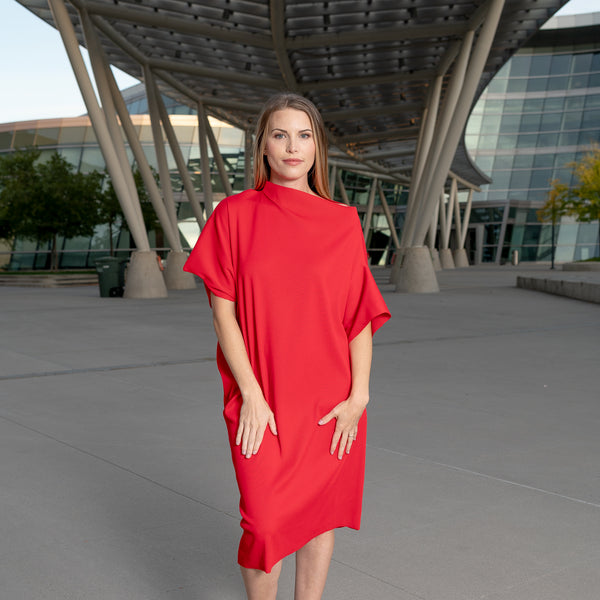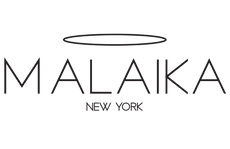SUSTAINABILITY
Malaika New York
Waste Less Patterns
90% of our collections and garments are made using innovative waste less techniques that significantly minimize our textile waste percentage; our minimized waste patterns result in an average waste of 7-20%, compared to the industry’s 30% average.
Sustainable Textiles / Upcycle
We implement as many sustainable and up-cycled textiles & materials as possible in order to further our goal of sustainability.
We only use GOTS or OEKO certificated cottons.
We aim for clean materials, which means 100% of the same material is used when possible in our collections. This ensures that our products can be recycled into new fabrics infinitely.
We use 5-10% of deadstock fabrics in our collections - these are fabrics that are meant for the landfills. By using them, we are reducing the amount of fabrics that are thrown away each year.
We create garments using a textile which is made with ECONYL® yarn. This is a high quality regenerated material made from discarded fishing nets, carpets and other nylon waste.
Throughout our collections, you will find small pieces of up-cycled bike tubes used as small appliqués. In order for us to utilize any up-cycled materials, we use a custom developed up-cycling process.
Dress made with ECONYL® yarn

Swatch Jacket
The Swatch Jacket is made from 100% up-cycled scraps from our past collections.

Sampling in house
We create all of our samples in house in order to lower our Co2 emissions. Developing a style at the manufacturer’s facilities adds a lot of Co2 to each style; a regular sample can be shipped back and forth up to 6 times or more before it is approved. At Malaika, samples are created and measured in house before technical drawings are sent to Turkey. By doing our sampling in house, we only need to create 1-2 samples before approval.
Made in EUROPE
MALAIKA New York proudly manufactures all products in Europe to ensure fair working conditions but also to lessen our C02 impact. Producing our products in Europe compared to Asia means that we our C02 is much less than companies producing in Asia. Our ability to manufacture close to Denmark means that we can easily oversee production when needed but we are also on the same time zone which make the communication instant. We work closely together with our agents and factories to monitor production is made in a healthy and safe working environment. Kopenhag Studio acts as an agent for Malaika New York in Turkey and they visit their sub contractors several times a week. By being located in Izmir, Kopenhag is able to maintain close relationships with their partners to ensure work conditions always remain in line with their high standards.
Currently, all of our products are manufactured at Kopenhag Studio in Izmir, Turkey. The factory is owned by the Danish designer By Signe (An old friend of Malaika). Kopenhag is focused on sustainable production, fair and safe working conditions, supporting sub producers in Izmir and preserving traditional Turkish textile craftsmanship techniques. They aim to assist brands with both environmentally and socially sustainable development methods.
Their organization structure is flat which means that everyone handles big responsibilities and they are all working together closely and helping each other with different tasks even outside of their own field. The flat structure creates an exciting working environment with training and personal development.
Kopenhag is big on supporting their local community by purchasing locally produced fabrics, which also contributes to a lower CO2 impact. As of now, they work with 4-5 ateliers (3-20 employees each) in Izmir, whose specialties range from woven fabrics to jersey fabrics and outerwear.
These small ateliers are the ones that cannot afford expensive certificates, but in general they are also working together on a more emotionally-attached way, so the employers care more about the individual worker. Kopenhag Studio is seeing all of them several times a week, they have close contact with both the employer (who is typically hands-on in the atelier as well) and employees to ensure that the conditions are living up to our standards. Kopenhag’s support of these local ateliers provides more healthy and safe work opportunities within the community.
All of Kopenhag’s employees, and the employees of their partner ateliers, are paid well above the region’s minimum wage in accordance with the local cost of living. In 2022 the minimum wage in Turkey increased by 51% but Kopenhag studio was already paying 2 times the minimum wage and therefore wasn't effected but they did increase their workers salary again. Kopenhag want to make sure that their workers are fairly paid. Kopenhag also gives their employees extra Holidays to ensure that they are healthy and well taken care off. Workers are working less than 48 hours a week, all overtime is voluntary and compensated at a premium rate. Maternity leave is also granted and replacements are hired in the mean time.
Finally all fabric waste that is being created at Kopenhag Studio is being recycled or kept for new projects.
Micro-plastics
We use fabrics with ECONYL® fibers but only those with a very tight weave to ensure very little microplastic gets into the waterways. We encourage our customers to spot clean and to wash our garments on cold which also limited the shed of micro-plastics. Our fur Poncho made from 48 plastic bottles is only to be dry-cleaned and never to be put into the washing machine.
Benefit of working with a small factory
Working with a small factory creates a possibility of producing low quantity which ensures less waste because if a style isn't popular it can always be sold because we only make 50-100 pieces per new style we add to our capsule collection.
Season-less Collection
Our designs are free from the limitations of traditional season-based garments. Our season-less collection can also be known as a capsule wardrobe. By creating designs that remain in style eternally, we ensure that each piece can be worn throughout the seasons, year after year. Wearing season-less pieces also promotes a wardrobe composed of less wasteful pieces.
Second Hand Machines & Furniture
In our studio we buy used equipment such as sewing machines, cover-stitch machines and overlock machines to further reduce waste and the necessity for raw materials. Most of our lights, mirrors and mannequins are also second hand items.
CO2
In our studio all of our light bulbs have been replaced to LED to save energy. The electricity that powers our studio is a mixture of wind, discarded wood, hay, solar, nature gas, oil, coal, left over heat from the industrial industry and more. We produce in Europe and we use trucks for our delivery when possible.
Packaging Materials
Most of our packaging materials are biodegradable and/or recyclable. Our biodegradable shipping pouches are derived from food waste. Our recyclable shipping boxes and packing slips are made from previously recycled paper. 70% of our products are packaged in biodegradable bags; we are working on getting to a 100% biodegradable solution for our bags. All of our plastic poly bags are marked with recyclable label LDPE #4 which can be recycled into shipping envelopes, paneling, tiles, plastic lumber, trash can liners and trash cans. We are working on finding a better solution.
Importance of Sustainable Fashion
Working towards a more sustainable lifestyle, which includes making educated choices about clothing, is important for the future livelihood of our planet. Fast Fashion is a growing issue that affects our planet on a daily basis. By outsourcing to overseas manufacturers, it becomes more difficult to regulate quality and waste as well as worker’s rights. Engaging in sustainable fashion choices helps resolve these issues.


